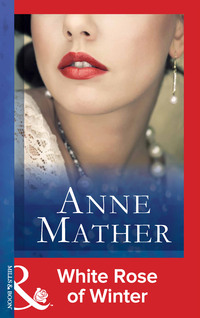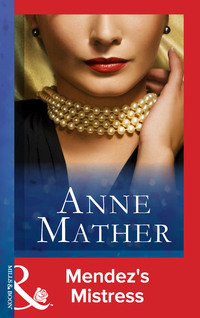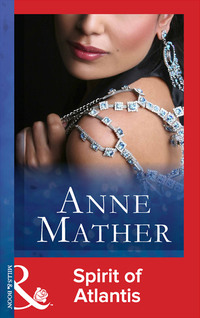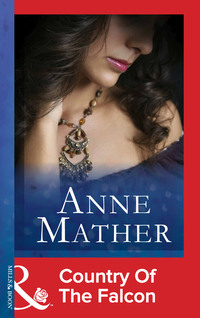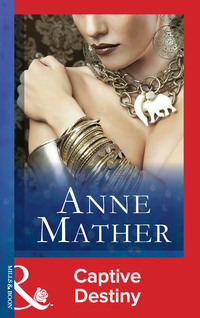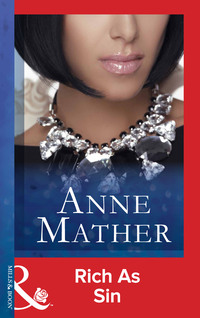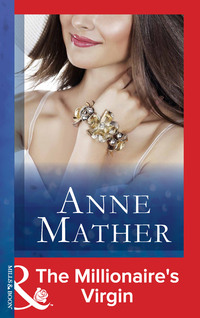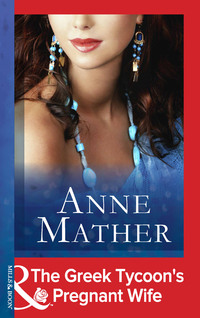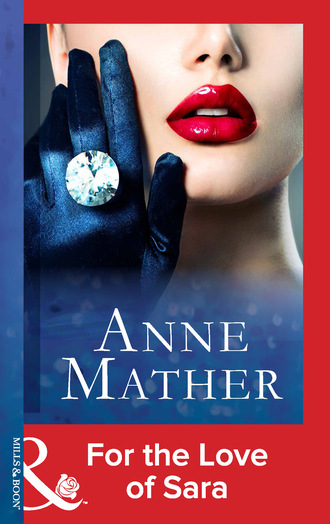
Полная версия
For The Love Of Sara

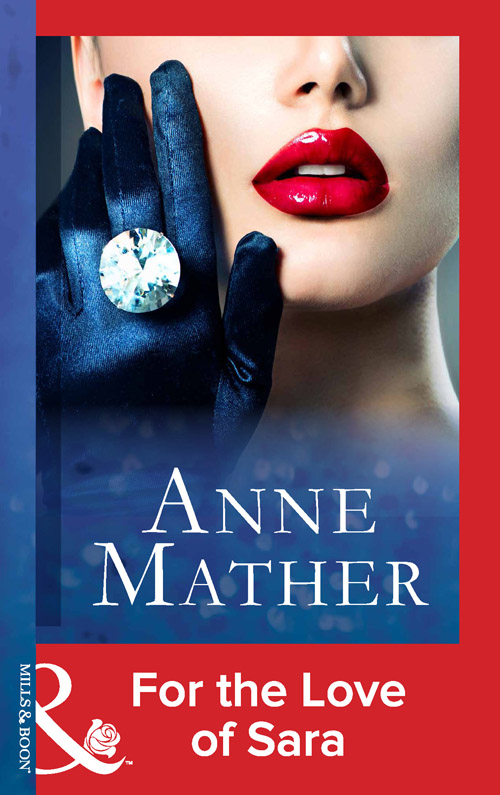
Mills & Boon is proud to present a fabulous collection of fantastic novels by bestselling, much loved author
ANNE MATHER
Anne has a stellar record of achievement within the
publishing industry, having written over one hundred
and sixty books, with worldwide sales of more than
forty-eight MILLION copies in multiple languages.
This amazing collection of classic stories offers a chance
for readers to recapture the pleasure Anne’s powerful,
passionate writing has given.
We are sure you will love them all!
I’ve always wanted to write—which is not to say I’ve always wanted to be a professional writer. On the contrary, for years I only wrote for my own pleasure and it wasn’t until my husband suggested sending one of my stories to a publisher that we put several publishers’ names into a hat and pulled one out. The rest, as they say, is history. And now, one hundred and sixty-two books later, I’m literally—excuse the pun—staggered by what’s happened.
I had written all through my infant and junior years and on into my teens, the stories changing from children’s adventures to torrid gypsy passions. My mother used to gather these manuscripts up from time to time, when my bedroom became too untidy, and dispose of them! In those days, I used not to finish any of the stories and Caroline, my first published novel, was the first I’d ever completed. I was newly married then and my daughter was just a baby, and it was quite a job juggling my household chores and scribbling away in exercise books every chance I got. Not very professional, as you can imagine, but that’s the way it was.
These days, I have a bit more time to devote to my work, but that first love of writing has never changed. I can’t imagine not having a current book on the typewriter—yes, it’s my husband who transcribes everything on to the computer. He’s my partner in both life and work and I depend on his good sense more than I care to admit.
We have two grown-up children, a son and a daughter, and two almost grown-up grandchildren, Abi and Ben. My e-mail address is mystic-am@msn.com and I’d be happy to hear from any of my wonderful readers.
For the Love of Sara
Anne Mather

MILLS & BOON
Before you start reading, why not sign up?
Thank you for downloading this Mills & Boon book. If you want to hear about exclusive discounts, special offers and competitions, sign up to our email newsletter today!
SIGN ME UP!
Or simply visit
signup.millsandboon.co.uk
Mills & Boon emails are completely free to receive and you can unsubscribe at any time via the link in any email we send you.
Table of Contents
Cover
About the Author
Title Page
CHAPTER ONE
CHAPTER TWO
CHAPTER THREE
CHAPTER FOUR
CHAPTER FIVE
CHAPTER SIX
CHAPTER SEVEN
CHAPTER EIGHT
CHAPTER NINE
CHAPTER TEN
CHAPTER ELEVEN
Copyright
CHAPTER ONE
JOEL left the motorway at the Salton turn-off and drove west into open country. Beyond the few villages which flanked the motorway, miles and miles of gorse-strewn moorland stretched before him, interspersed here and there with cottages, their smoking chimneys the only sign of habitation. There were sheep in plenty, of course, straying carelessly on to the road in front of him so that he was continually bearing down on the brake, and the impatience that filled him at the necessity for this journey grew with every second wasted. At any other time, the artistic sensitivity which had ensured his success in his chosen profession would have responded to the almost miraculous blending of colour as evening had shadowed the slanting rays of the sun. The pale turquoise of the horizon now the sun had set shimmered with the approaching dusk and set the stars trembling. But right now Joel’s thoughts were much less pleasantly occupied, and he felt no affinity with this windswept landscape, only irritation that his destination was so remote from the civilisation he was used to. The occasional cars that passed him going in the opposite direction were forced to remove themselves from their positions on the crown of the road by the sheer width of the Mercedes, and he reflected broodingly that drivers around here apparently considered they had the free and only rights to the highway. He was not in a mood to be generous in this direction; his stomach was telling him he hadn’t eaten since breakfast, and he longed for a drink to cool his frustration.
He glanced at the plain gold watch on his wrist. It was already past seven o’clock. It would be night soon, and he had no desire to negotiate these roads after dark. It was incredible to think that only a little over an hour ago he had been bypassing the industrial centres of Doncaster and Leeds when now he seemed distant from everything urban. That was why he hadn’t stopped earlier although the service areas on the motorway had mocked his good sense. He estimated he had only another five or six miles to go to Langthwaite, and with a bit of luck the hotel there would be able to supply all his needs. At least, until tomorrow.
He sighed and flexed the fingers of first one hand, then the other. It had been after two when he left London, so he supposed he had made reasonable time. He hadn’t rushed, but again he hadn’t wasted time. He had been singularly reluctant to reach his destination when he set off, and although that had changed, his feelings were definitely mixed. Deep inside him there was a hard core of bitterness about the whole affair, and no amount of soul-searching would convince him he was doing the right thing. He had said he would do it for Francis’ sake, but was that entirely true
He shifted irritably, unwilling to investigate his motives. He was here now, he had to go through with it. Twilight was deepening, but there were lights up ahead and he turned on the car’s lights to read the sign. He almost missed it, a gravestone-like fixture at the side of the road, half hidden by the long grass. He wondered if the connotation was significant and then shook his head impatiently. This was no time for self-doubt or self-delusion.
The village was small, a collection of cottages clustered about a cobbled square. There was the inevitable telephone box outside the post office, a general dealers, which looked as though it sold everything, but probably didn’t, and the inn. The Golden Pheasant! Joel’s mouth turned down at the corners. It made a change from the Black Bull or the Bay Horse, he supposed. It certainly did not have the appearance of a five-star hostelry, but if the beds were clean and the beer was cold, he would have no objections.
There were one or two teenagers loafing about in the square, and the sight of the sleek cream Mercedes attracted a few coarse comments. Joel was forced to leave the car outside the inn, trusting to God and providence that no one would run a rusty nail along its side. Where was the age-old rustic charm he had imagined? Gone like everything else beneath the heel of indifference? At least there was no regimented housing estate encroaching on the village boundaries, and it was too far from the nearest town to attract evening commuters.
Leaving his one case in the boot, Joel pulled his sheepskin jacket on over his shirt and pants, and sliding the knot of his tie up to his collar he entered the bar entrance which appeared to be the only means of access. It was still comparatively early in the evening, and there were only one or two elderly patrons occupying the tables in the bar, but the girl who was serving was young, and pretty too if you liked buxom blondes. She was obviously intrigued by the appearance of a dark stranger, and Joel could feel her assessing him from the thickness of his straight hair to the soles of his suede boots. What she saw she apparently approved of, because the look she bestowed on him was warm and encouraging.
“Yes, sir? What will it be?”
Joel hesitated, then he drew his wallet out of his inside pocket. “Oh — er — I’ll have a beer.” He glanced round. “You do take overnight visitors here, don’t you?”
The girl filled his glass and pushed the foaming beverage across to him. Her eyes had widened and she was regarding him curiously now. “Overnight visitors, sir? At the inn? Well, I think Mr. Harris takes one or two. I’m not sure whether at this time of year…” She handed him the change from a pound note, holding his gaze with her own. “Would you like me to find out for you?”
Joel slid the silver into his pocket. “If you wouldn’t mind,” he agreed, raising the glass to his lips and drinking thirstily.
The girl regarded him for another inquisitive moment, and then with a shrug she turned and went out. Joel lowered his weight on to a bar stool. The beer was good — cold, as he liked it, and refreshing after his hours at the wheel. He was aware that his presence was causing a minor argument in the corner between two of the older patrons, and he guessed they got few visitors in Langthwaite at this time of year.
The girl was coming back and with her was a middle-aged man, obviously the licensee. Joel forced a smile and had it doubtfully returned. “You’re wanting accommodation, I hear,” Mr. Harris stated, leaning on the bar. “Would it be for long?”
“One night only, I expect,” replied Joel evenly.
“You’re a traveller, then, sir?” suggested the older man, curiously, but Joel shook his head.
“I — I have business in Langthwaite,” he conceded, realising that by saying nothing he was likely to be turned away. “Can you put me up?”
“Well, it’s nothing fancy like,” retorted Mr. Harris. “There is a room you can have. My wife’s making up the bed now. Would you be wanting meals as well?”
Joel restrained the impulse to swear. Of course he wanted meals. Did they think he was without the normal demands of the human body? “If — that’s possible,” he remarked, with admirable calmness. “Naturally, I don’t expect your wife to put herself out for one guest. Some sandwiches this evening would do fine, and perhaps some toast in the morning.”
Mrs. Harris, or at least Joel assumed it was that lady, appeared behind them. “Is this the gentleman who is wanting to stay the night?” she asked, and her husband nodded. “Very well, sir. Your room’s ready. And I expect you’re hungry, aren’t you?”
“I — well —” Joel looked helplessly at Mr. Harris, and he nodded with a finality that displayed a decision made.
“Yes, Ellie. The gentleman — I don’t know your name, do I, sir? — he is hungry—”
“Kingdom,” said Joel at once, “Joel Kingdom. From London.”
In what seemed a remarkably short space of time, he was shown to his room on the first floor, given free use of the bathroom, and then fed in a tiny dining room which he suspected was generally only used by the family. Mrs. Harris herself served him, although the blonde from the bar found the excuse to pop in and out asking him whether he had everything he wanted. Joel, who was used to the effect his swarthy attraction had on the opposite sex, found her obvious charms less than appealing, and his mouth was wry by the time he had eaten soup, cold roast beef and pickles, and a piece of Mrs. Harris’s crusty apple pie.
Mrs. Harris herself bustled in as he was finishing the lager he had had with the meal and she looked gratified at his empty plate. “You enjoyed it, then, sir?”
Joel nodded, massaging the aching muscles of his left shoulder. “It was very good, thank you, Mrs. Harris. You’ve been very kind.”
Mrs. Harris beamed, her plump face mirroring her pleasure. “And you’re only staying until tomorrow?” she asked, beginning to gather the dirty dishes together.
Joel rose to his feet. “I hope so.” Then, as she quickly looked up, he added: “I mean, of course, I hope my business doesn’t take longer than that.” He sighed. “I have to get back to London.”
“You work in London, Mr. Kingdom?”
“Sometimes.” Joel was non-committal.
“But your home’s there?”
“You could say that.”
Mrs. Harris was clearly trying to find an opening to ask what business he had in Langthwaite, and Joel was equally unwilling to assist her. He suppressed a yawn with his hand, and said:
“If you don’t mind, Mrs. Harris, I’ll go up to my room now. It’s been a long day, and I am rather tired.”
Mrs. Harris hid her frustration. “Of course, sir. You know where it is?”
“Of course.” Joel smiled, and the woman responded to the spreading charm it generated. “I’ll say goodnight, then.”
“Goodnight, sir.” Mrs. Harris smiled in return, and Joel turned to cross the hall to the stiarcase.
The blonde appeared in the doorway to the bar. “Aren’t you coming back for another drink?” she asked him coyly.
Joel shook his head. “No, thank you.”
“You’re never going to bed!”
“Why not? It is after ten o’clock, you know.”
“Mercy me! Ten o’clock!” The girl raised her eyes heaven-ward. “I thought you Londoners were used to late hours. What’s happened to the swinging seventies?”
“I think they hanged themselves,” returned Joel dryly. “Goodnight.”
His room was under the eaves, and the ceiling sloped towards the window. He could stand upright just inside the door, but from then on it was a losing battle. Still, the bed looked long and comfortable, and he would be glad to stretch his aching limbs. That work-out in the gym that morning had been intended to relax his mind as well as his body, but the way he felt right now it hadn’t succeeded in either direction.
The bathroom didn’t sport a shower, but he ran a shallow bath and sluiced himself before going back to his bedroom. Then he removed his robe, turned out the light and slid between the cotton sheets. The bed was icily cold. The inn was not centrally heated. But the heat generated by his thoughts soon warmed him through.
He lay on his back with his arms behind his head and stared grimly towards the shadowy flowers visible on the cretonne of the curtains. So — he was here, in Langthwaite, and somewhere out there, within a mile’s radius, was Rachel — Rachel Gilmour as she called herself now, but Rachel just the same.
Bitterness brought the sickly taste of bile to the back of his throat. That Rachel should think she could do this, to him! His hands balled themselves into fists. If he had her here now, he thought, he would wring her neck!
But such passion was wasted, and he knew it. Coolness and calmness, and a sense of objectivity would serve him far better. After all, he could not be absolutely sure she was doing it to spite him, although the alternative was equally unpalatable…
He deliberately unclenched his fists and forced the muscles of his neck to relax. Was it really only three days ago that Francis had come to him with the story? It seemed as though he had known it for much longer than that.
He had been working, he remembered, putting the finishing touches to the portrait of Lady Antonia Barrie, when Francis came hammering at his door. He had not been pleased at the intrusion. He had got up especially early to take advantage of the light, and when his half-brother interrupted him he had been less than civil. It wasn’t until Francis had stammered out the story in that way he had when he was distressed that Joel realised this wasn’t another of the simple monetary scrapes Francis had often got himself into.
Even then he had been loath to get involved. “But I don’t see why you should imagine the fact that our father is thinking of getting married again should trouble me!” he had declared impatiently.
Francis, as tall as himself but thinner, fairer, had paced restlessly about Joel’s studio. “Of course, it wouldn’t bother you, would it?” he had demanded fiercely. “Your grandmother left you more than adequately provided for. Unfortunately, I don’t have rich relations like that on my mother’s side. And if Father marries again, why shouldn’t he disinherit me, as he disinherited you?”
Joel had raked his hair back from his forehead with frustrated hands. “That didn’t trouble you too much at the time,” he observed dryly. Then: “It was different with me, Fran, you know it was! Father could never see that I wasn’t cut out to play power politics at the Bank. And, as you say, my grandmother made Father’s participation in my career less than necessary. You’re different, Fran. You’re his son. And even if he does marry again, which I personally doubt, there’s little chance now that he’ll sire more children. Good God, he’s sixty-three!”
Francis turned on him then. “Men have been known to have children at ninety, and you know it!” He paused, his face changing, becoming more calculating. “Besides,” he regarded his half brother scornfully, “you haven’t heard it all yet. You haven’t asked who the woman might be.”
Joel shrugged. “Does it matter?”
“It might. Her name is Gilmour, Rachel Gilmour.” He hesitated, enjoying the effect his words were having. “Her name was Rachel Abbey before she married her first husband!”
And that was when Joel had crossed the studio and done something entirely uncharacteristic. He had caught his haf-brother by his shirt front and dragging him up close to him said savagely: “What are you saying?”
Francis, abashed by his older brother’s intimidation, had struggled to free himself. “It — it — it’s the — t—truth, Jo—Joel! It — it is — Ra-Rachel, it — it is!”
Joel had released him so violently that Francis had spun across the studio and landed on the floor amidst a pile of canvases and an easel. His face had twisted angrily as he got to his feet, and as he brushed his clothes he had stared maliciously at his brother.
“It — it’s not m-my fault!” he muttered, grimacing as his stammer continued. “Just — just because — you d—don’t like the — tr—truth when you — hear it!”
Joel had hardly been listening to him. He believed Francis all right. He wouldn’t come here with a story like that unless he had proof that it was true. But that didn’t make it any better. Searching for a cheroot amongst a mess of paints and sketches on the long board beneath the window, he put one between his teeth and lit it with hands that were no longer steady. Then he stared grimly out of the window for several silent minutes, looking over the rooftops of London to the curve of the Thames in the distance. When he had himself under some semblance of control he turned back to Francis. The younger man had lit a cigarette and was puffing at it nervously, but his expression was defiant when Joel said:
“Tell me what you know,” in low uncompromising tones.
Francis shifted from one foot to the other. “I’m not sure I want to tell you anything,” he muttered.
Joel’s jaw stiffened. “Don’t tempt me, Francis,” he said, in the same low tone. “Now, how do you know it’s — Rachel?”
“I’ve seen her!”
“You’ve — what!”
“I — I’ve seen her. Oh, for God’s sake, Joel, stop looking at me like that! It’s not my — f—fault.”
“Go on. Where did you see her?”
“L—last night. With — with Father! It — it’s true!” This as Joel threw his cheroot to the floor and ground it under his heel. “They — they were — d—dining together.”
“Where?” Joel took a step towards him, and Francis took a step backward.
“At — at — Peruccios. I — I saw them, I tell you.”
Joel moved his head disbelievingly from side to side. “Start at the beginning.”
Francis drew heavily on his cigarette, and blew the smoke into the air above their heads. “Well — well, I’ve — I’ve known for some time that — that there was a woman … oh, yes, I have. Since — since my mother left — I’ve always been able to tell.”
“For the Lord’s sake, get to the point!”
“Well — well, about — about a week ago, Father told me that — that there was someone —”
“But you didn’t choose to tell me that!”
“Not immediately, no!” Francis was defensive. “Joel, as you’ve just pointed out, he’s sixty-three! I assumed — who wouldn’t have? — that — that this women, whoever she might be, would be a contemporary of his! After all, you have to admit, both your mother and mine were near his own age at the time he married them.”
“All right, all right. Go on.”
“Well, I didn’t say much, I didn’t ask much. He told me—oh, how he must have laughed when he told me — that her name was Mrs. Gilmour, Mrs. Rachel Gilmour. Rachel’s not such an uncommon name, is it?”
“And that was all?”
“No. No, he said — she came from Yorkshire. That — that she worked in a village called — Langth — whistle, Langthwaite — something like that — as — as a housekeeper to a retired colonel.”
“A housekeeper to a retired colonel!” Joel repeated the words sceptically.
“Yes. Yes, that’s what he said!”
“You must have made a mistake —”
“I tell you, I saw her —”
“Not about that. About — what she’s doing.” Joel’s fists clenched. “Francis, you know Rachel was at college — when — when —”
“When she walked out on you? I know. But how do you know she finished her training? That — that was six years ago. She — she’s been married. She — she’s got a child!”
“A child?” Joel’s tanned face was pale. “Did Father tell you this too?”
“Y — yes.” Francis stubbed out his cigarette in an onyx ashtray. Then he looked up. “Th—that might account for the fact that she’s someone’s housekeeper, mightn’t it? I mean, it’s not easy to get jobs with — with children.”
“And — her husband?” Joel’s eyes were narrowed beneath heavy lids.
Francis shrugged. “How should I know? Dead, I suppose. Father said she was a — a widow!”
“A widow?” Joel paced restlessly across the room. “I don’t believe it!” He swung round on his half-brother. “Are you sure this isn’t all some malicious trick to get his own way?”
“Wh—what do you mean?”
Joel shook his head. “I don’t know, I don’t know. Father always hated me for thwarting him —”
“I don’t think he hates you, Joel —”
“Don’t you? I do. I think he’d marry Rachel just for that reason.”
“You’re crazy!”
“Am I?” Joel’s expression was broodingly malevolent. “If I thought…” He broke off. “Is that all?”
“What — what more can I tell you?”
“What did Father say when he told you?”
“I’ve told you everything I know.”
“Except how you came to see them together last night.”
Francis sighed. “That was accidental. Father doesn’t know I saw them.”
“So?”
“I was going to Freddi’s,” he named a gambling establishment with which Joel was not unfamiliar, “but I was short on funds —”
“—as usual—”
“— and I suddenly remembered Perry Simons.” Perry Simons owned Peruccios. Joel knew this, too. “I went round there, I was going to ask him for a loan. Then I saw them.”
“And you left?”
“Yes.”
“What time was that?”
Francis glanced at his watch. “Around eleven.”
“And it’s eight-thirty now. What have you been doing for nine and a half hours?”
Francis shook his head. “I — I didn’t know wh—what to do. I — I didn’t kn—know wh—whether to t—tell you or not.”
“Why not?”
Francis shook his head. “I w—walked for m—miles. I ended up b—back at the fl—flat at about four. I would have r—rung you then, but I th—thought you m—might be — other — otherwise engaged.”


